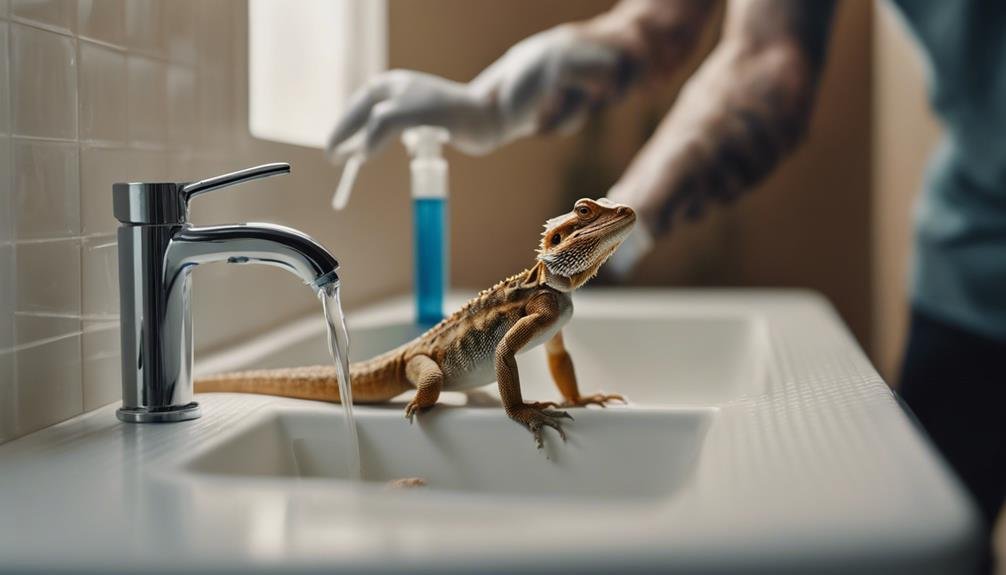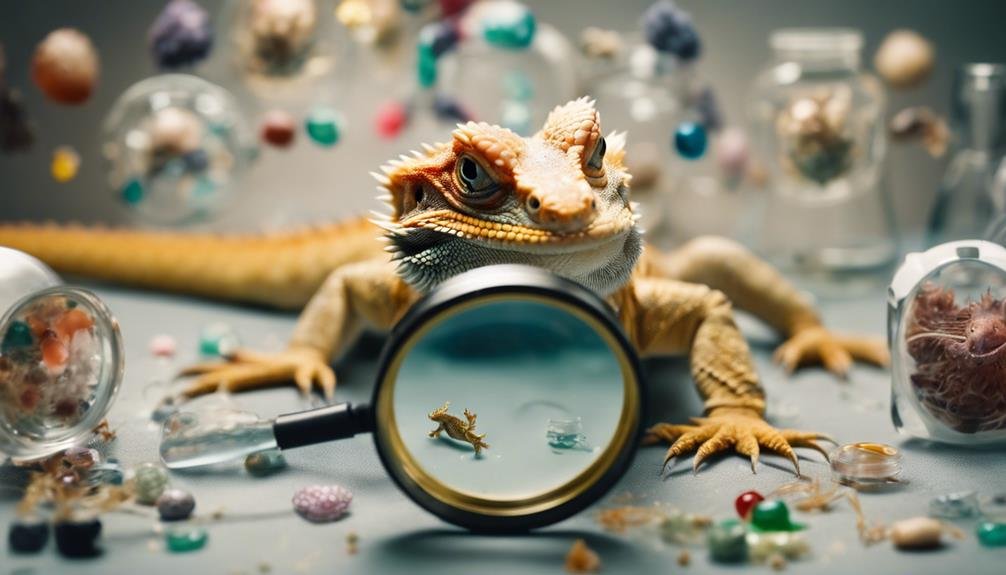If you’re considering bringing a bearded dragon into your home, you’ve probably wondered about the health risks they might pose to both you and your family. Yes, these popular pets can indeed carry diseases, including Salmonella, which can be transmitted to humans. But don’t let this deter you just yet. By understanding the common illnesses bearded dragons face and the steps you can take to prevent disease transmission, you’ll be better equipped to guarantee your scaly friend remains a healthy and safe companion. So, why is it critical to prioritize these preventive measures, and how can you implement them effectively? Let’s explore.
Key Takeaways
- Bearded dragons can harbor Salmonella in their droppings, posing a risk to humans.
- They may also be carriers of parasitic infections like pinworms and coccidia.
- Symptoms of a Salmonella infection include diarrhea, fever, and stomach cramps.
- Prevent disease transmission through thorough handwashing and avoiding close contact with bearded dragons.
- Regular vet visits and proper hygiene practices are crucial for the health of bearded dragons and their owners.
Understanding Zoonotic Diseases
Zoonotic diseases, like Salmonella often carried by bearded dragons, can frequently transfer between animals and humans, posing significant health risks. When you own or interact with bearded dragons, it’s important to be aware of how these infections can affect you and your family. Bearded dragons can harbor Salmonella in their droppings, which can contaminate their living spaces, any surfaces they come in contact with, and, if you’re not careful, your hands.
Symptoms of a Salmonella infection might include diarrhea, fever, and stomach cramps, usually kicking in from 6 hours to 6 days after exposure. This means you’ve got to be on your toes, especially if you fall into the high-risk groups like children under 5, adults over 65, or anyone with a weakened immune system. These groups are more susceptible to severe infections and complications.
To prevent the spread of these zoonotic diseases, you should practice thorough handwashing every time after handling your bearded dragon or anything in their environment. Avoid close contact, such as cuddling your bearded dragon close to your face, to reduce the risk of infection. Remember, contaminated surfaces are a no-go zone until they’ve been properly cleaned. Taking these precautions can make a significant difference in keeping you and your bearded dragon healthy.
Common Diseases in Bearded Dragons
As you explore the health of your bearded dragon, it’s important to recognize symptoms like weakness and respiratory issues, which signal illness.
You’ll learn how preventative measures, including regular vet visits and proper hygiene, play a significant role in keeping your pet healthy.
Symptoms of Illness
When your bearded dragon shows signs of lethargy, loss of appetite, or abnormal behavior, it’s likely they’re battling an illness. These symptoms of illness can signal a range of conditions from metabolic bone disease due to improper nutrition and lack of UV-B light, to more severe infections such as respiratory issues or infectious stomatitis. Be alert for these signs as they can deteriorate your pet’s health rapidly.
| Disease | Symptoms | Cause |
|---|---|---|
| Metabolic Bone Disease | Lethargy, weakness | Improper diet, lack of UV-B light |
| Respiratory Infections | Sneezing, eye/nose discharge, rapid breathing | Various pathogens |
| Infectious Stomatitis | Swelling, inability to eat | Bacterial infection |
| Atadenovirus Infection | Fatal hepatitis, gastrointestinal issues, paralysis | Viral infection |
Addressing these symptoms early can prevent further health complications.
Preventative Health Measures
In order to protect your bearded dragon from common diseases, it’s important to adopt certain preventative health measures. Bearded dragons can carry Salmonella in their droppings, which poses a risk of infection to humans. To prevent the transmission of this and other diseases, it’s vital to wash your hands thoroughly after handling your dragon or cleaning their habitat. Avoiding close contact, such as kissing or snuggling, can further reduce the risk of Salmonella infection.
It’s also important to keep your bearded dragon out of food preparation areas to prevent contamination. Regularly cleaning and disinfecting your dragon’s supplies will help maintain a clean, healthy environment for both you and your pet, effectively preventing the spread of infections.
Treating Common Conditions
Having implemented preventative health measures for your bearded dragon, it’s equally important to know how to treat common conditions they may still encounter. Bearded dragons can suffer from diseases like CANV, Atadenovirus infection, MBD, infectious stomatitis, and respiratory infections.
CANV, a severe fungal infection, necessitates a vet examination and antifungal treatment. Atadenovirus infection, potentially fatal, requires immediate veterinary attention to manage symptoms like weakness and lack of appetite. For MBD, caused by dietary deficiencies, calcium supplementation, a proper diet, and UV-B light are essential.
Infectious stomatitis and respiratory infections also demand prompt vet care, with treatment tailored to the specific diagnosis. Ensuring your bearded dragon receives the right care for these common diseases is key to their health and well-being.
Human Health Risks
While bearded dragons make fascinating pets, it’s important you’re aware of the health risks they can pose to humans. From Salmonella transmission, which can lead to serious illness, to the potential for parasitic infections and allergic reactions, understanding these risks is vital for your safety.
Taking preventive steps can greatly reduce these dangers, ensuring both you and your scaly friend stay healthy.
Salmonella Transmission Risk
Bearded dragons’ droppings can harbor Salmonella germs, presenting a substantial risk of transmission to humans. Between April 2021 and January 2023, 32 cases of human Salmonella infections were linked to contact with these pets across 20 states.
Symptoms, including diarrhea, fever, and abdominal cramps, can appear 6 hours to 6 days after infection. High-risk groups, such as children under five, the elderly, and those with weakened immune systems, face a greater risk of severe infection.
To prevent Salmonella transmission, it’s vital to supervise interactions between bearded dragons and humans, practice thorough handwashing, and avoid contact between the reptiles and food preparation areas. These measures can greatly reduce the transmission risk and protect against human infections.
Parasitic Infections Concern
Did you know that your bearded dragon can transmit parasitic infections like pinworms and coccidia, posing significant health risks to humans? These tiny invaders can lead to uncomfortable symptoms, including diarrhea, abdominal cramps, and other gastrointestinal issues. It’s essential to understand that while bearded dragons make fascinating pets, they can carry parasites harmful to humans if proper hygiene practices aren’t followed.
To mitigate these risks, always supervise interactions between bearded dragons and people, especially children, who mightn’t understand the importance of hygiene. Thorough hand-washing after handling your pet or cleaning its habitat is a must to prevent the transmission of parasitic infections. By educating yourself and others on the importance of cleanliness, you can enjoy the company of your bearded dragon without compromising anyone’s health.
Allergic Reactions Potential
In addition to parasitic infections, you may not realize that contact with bearded dragons can also lead to allergic reactions for some individuals. Here are three key points to take into account:
- Handling bearded dragons may trigger allergic reactions, such as respiratory issues or skin irritation, particularly in sensitive individuals.
- Individuals with compromised immune systems should be especially cautious, as their susceptibility to infections and health risks from allergic reactions is higher.
- Proper hygiene practices, like thorough handwashing after contact with bearded dragons, are essential to minimize the risk of allergic reactions and infections.
Preventing Disease Transmission
To prevent disease transmission from bearded dragons, you must practice good hygiene, including thorough handwashing after interaction. Bearded dragons can harbor Salmonella germs in their droppings, which can contaminate their bodies and anything they come into contact with. This makes handwashing not just a necessity for anyone who handles these pets or their environment. Especially when it comes to young children, supervision is key to make sure they wash their hands properly after touching or feeding the bearded dragon. This step is vital in preventing the spread of disease.
Additionally, adopting preventive measures can greatly reduce the risk of disease transmission. Avoid close contact such as kissing or snuggling with your bearded dragon, as it increases the risk of transferring Salmonella germs. It’s also essential to keep the dragon away from areas where food is prepared to prevent any cross-contamination. Regular cleaning of the dragon’s supplies and habitat will further minimize the risk. By adhering to these guidelines, you’ll create a safer environment for both your family and your bearded dragon, ensuring everyone remains healthy and happy.
Safe Handling Practices


Understanding the importance of preventing disease transmission highlights the need for adopting safe handling practices when interacting with your bearded dragon. Bearded dragons can carry Salmonella germs in their droppings, which poses a significant risk of infection to humans. To safeguard your health and enjoy your pet safely, follow these essential guidelines:
- Practice Proper Handwashing: Always wash your hands thoroughly with soap and water after handling your bearded dragon, cleaning their habitat, or touching any of their supplies. This simple step is critical in preventing the transmission of Salmonella and other germs.
- Avoid Close Contact: As tempting as it might be to snuggle or kiss your pet, doing so can increase the risk of Salmonella infection. Maintaining a bit of distance helps prevent disease transmission without compromising the bond you share with your bearded dragon.
- Keep Their Supplies Clean: Regularly cleaning and disinfecting your bearded dragon’s supplies, including their habitat, is essential in minimizing the spread of germs. Additionally, maintain their living area well and keep it away from your kitchen or places where food is prepared to avoid contamination.
Adhering to these safe handling practices ensures a healthy environment for both you and your bearded dragon, greatly reducing the risk of infection and illness.
Choosing a Healthy Bearded Dragon
When selecting a bearded dragon, it’s important to look for signs of health such as active behavior and clear eyes. Observing the bearded dragon’s behavior is essential; healthy bearded dragons are alert and show curiosity about their surroundings. This active demeanor is a good indicator that the bearded dragon you’re considering is in good health.
Additionally, inspect the bearded dragon’s eyes, which should be bright and clear, indicating that it’s free from potential eye infections or diseases. The skin is another critical aspect to examine. It should be smooth and intact, without any sores, lesions, or signs of shedding problems, which could signal underlying health issues.
A healthy appetite is another sign of a well bearded dragon. When choosing, look for dragons that show enthusiasm to eat, as this indicates a good internal health status. Also, check the vent area, ensuring it’s clean and observe the bearded dragon’s bowel movements if possible, as irregularities could indicate health problems.
Can Nocturnal Behavior in Bearded Dragons Affect their Disease Carrying Abilities?
Understanding bearded dragon sleeping patterns is important in determining their disease-carrying abilities. Nocturnal behavior in bearded dragons can affect their overall health, which may impact their ability to carry diseases. Monitoring and managing their sleeping patterns is crucial for maintaining a clean and healthy environment for both the dragons and their owners.
Frequently Asked Questions
Can You Catch Diseases From Bearded Dragons?
Yes, you can catch diseases from bearded dragons due to zoonotic risks. Their droppings sometimes harbor Salmonella, leading to disease transmission through skin infections or cross-contamination.
Prioritize bearded hygiene, practice safe handling, and guarantee your pet’s cleanliness to mitigate risks. Quarantine new dragons, understand the importance of immune responses, and don’t skip regular veterinary checks. High-risk groups should be extra cautious to prevent severe illness.
Always wash your hands thoroughly after interaction.
How Rare Is It to Get Salmonella From a Bearded Dragon?
Getting Salmonella from a bearded dragon isn’t as uncommon as you might think. It’s important to follow safe handling and disinfection practices to minimize your risk. Always wash your hands after touching your pet and maintain good pet hygiene.
Keep an eye on any Salmonella symptoms and consult veterinary advice for health monitoring and quarantine procedures if needed. Those with a weaker immune system should be extra cautious to prevent infection.
How Can I Prevent My Bearded Dragon From Getting Disease?
To keep your bearded dragon healthy, focus on their diet, ensuring it’s balanced with the right nutritional supplements.
Keep their habitat clean and at the proper temperature, and don’t forget the UVB lighting for their well-being.
Regular vet visits are essential for early disease detection and parasite prevention.
Quarantine any newcomers to prevent the spread of infections.
Reducing stress and maintaining proper hydration also play a key role in disease prevention.
What Are the Risks of Handling a Bearded Dragon?
Handling a bearded dragon comes with risks, including exposure to zoonotic pathogens like Salmonella, which can lead to serious illness, especially if you’re immune-compromised. Poor hygiene practices and incorrect handling techniques can increase these risks.
Always wear protective gear, observe quarantine protocols, and note your pet’s stress signs to prevent bites. Skin allergies and environmental stressors also pose a threat.
It’s essential to maintain cleanliness to safeguard your health and your pet’s well-being.
Conclusion
In summary, bearded dragons can carry diseases, including Salmonella, that pose risks to humans. It’s important to be aware of their common illnesses, like Metabolic Bone Disease and Respiratory Infections, to prevent transmission.
You’ll need to practice good hygiene, keep their environment clean, and make sure they’ve a healthy diet. Always wash your hands after handling your dragon or their habitat.
By choosing a healthy bearded dragon and following these guidelines, you can enjoy a safe and rewarding companionship.


